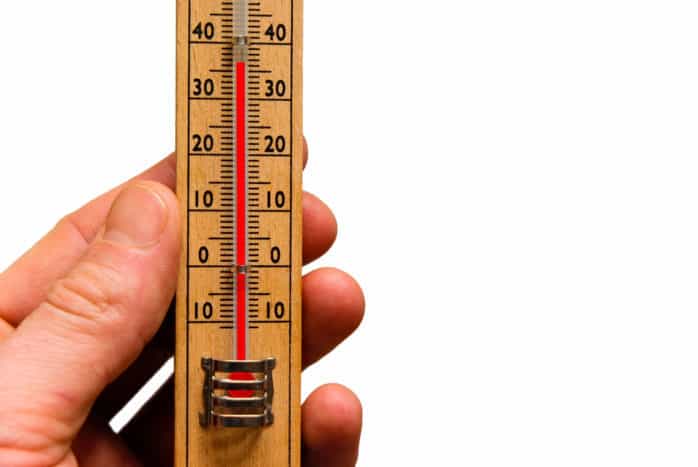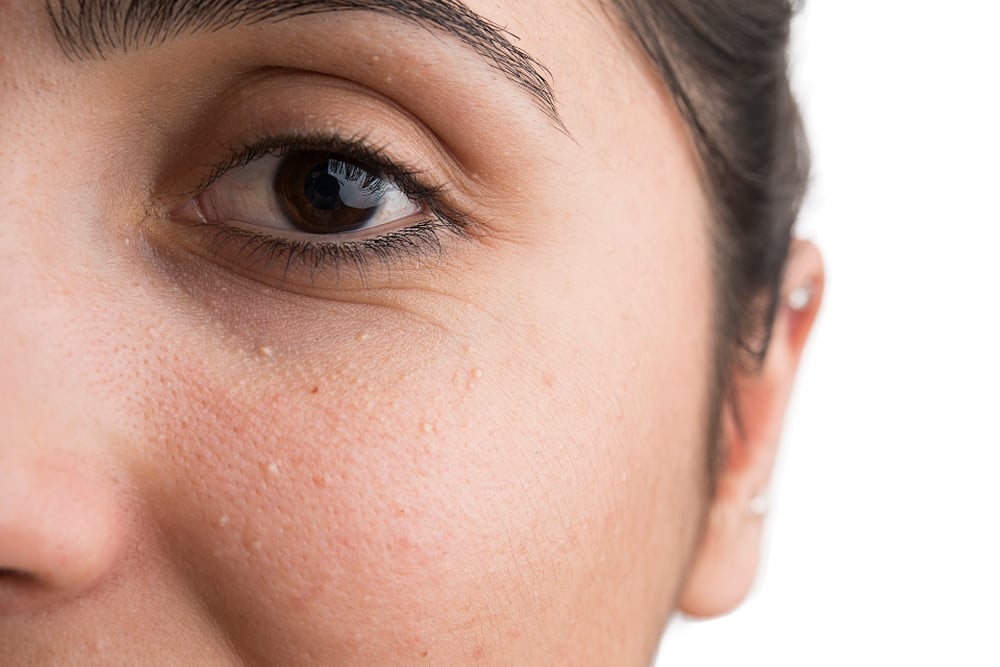Contents:
- Medical Video: Is it normal for a pregnant woman's body temperature to rise?
- What is the normal body temperature of a human?
- What causes body temperature to go up and down?
- 1. Body growth
- 2. Hormonal changes
- 3. Circadian rhythms
- 4. Fever
- 5. Hypothyroidism
- 6. Diabetes
- Other unique facts about a person's body temperature
- 1. Smoking can make your body temperature rise
- 2. Being lying also makes body temperature rise
- 3. Cold temperatures make you sleep better
- 4. Know the time of one's death
- Then, how to maintain a normal body temperature when cold weather hits?
Medical Video: Is it normal for a pregnant woman's body temperature to rise?
Normal body temperature in your body can continue to change throughout the day. This is because the human body is able to change its own core temperature according to the seasons and the surrounding environment. The body temperature of a healthy person can go up and down around 0.5 ° C in a day; can be lower in the morning and higher in the evening, depending on what your activities are on that day.
That is, the ever-changing body temperature is actually a natural part of your body's defense mechanism. However, it is important to ensure that a fluctuating body temperature is not the result of the underlying medical condition. Continue reading to learn more about normal human body temperature, and what can cause changes.
What is the normal body temperature of a human?

Most people think that normal human body temperature must definitely be at 37ºC. However, this concept is rather misleading and has been refuted by many medical studies.
A study published many years ago in the Journal of the American Medical Association found the average normal temperature for adults is 36.7 ° C, not just 37 ° C.In general, the medical world agrees that normal body temperature ranges between 36.1 ° C to 37.2 ° C.
Although these standards will also depend a lot on:
- Physical condition of the person.
- Age.
- What activities have they done.
- Time of the day.
- Which temperature of your body is measured - For example, reading the temperature of the armpit usually shows 0.5°C is lower than the body's core temperature.
Meanwhile, body temperature tends to decrease with age. One study by researchers at Winthrop University Hospital in New York found that older people had a normal body temperature lower than the "standard" above. Of the 150 elderly people with an average age of about 81 years, researchers found that their body's average temperature never reached 37 ° C. These findings indicate that even when the elderly are sick, their body temperature may not rise until it reaches a temperature that people recognize as a fever (more than 37ºC). On the other hand, body temperature that is too low (below 35ºC) is generally a sign of certain diseases.
Thus, limits on body temperature so that fever can be said will also be different for each person based on the time of day. The point is, to be able to find out a person's normal body temperature, each variation of the factor must be taken into account.
What causes body temperature to go up and down?
The body changes its temperature to adjust to the changes around. You will sweat when in a hot environment to help keep your body cool. On the other hand, your body will try to keep it warm when the temperature around you is low. To do that, the brain sends signals throughout the body to supply more blood from the capillaries to warm parts of the body. This response will make you tremble shivering. Shivering can produce heat so your body can maintain its body temperature.
Body temperature can also experience changes when you smoke, drink alcohol, and even when you lie. Here are some other common reasons behind normal body temperature fluctuations:
1. Body growth
The fluctuating body temperature is commonly experienced by baby. The reason is none other than not because they are still in their growth period, so that the body's internal system has not reached its most optimal function. The baby's body temperature can increase within a few days of birth but will drop slightly when the baby is up to middle age.
2. Hormonal changes
Body temperature is very sensitive to hormone levels. So, a woman's temperature may be higher or lower when ovulating or menstruating. The same thing will happen after menopause. Conversely, metabolic changes during pregnancy cause an increase in body temperature.
3. Circadian rhythms
Body temperature may change according to changes biological clock (circadian rhythm) of the body. The lowest body temperature usually occurs in the last 2 hours before you wake up. You can also feel cooler at certain times apart from the stable surrounding temperature.
4. Fever
Fever is a common symptom, not an independent disease. You will have a fever if there is an infection in the body caused by a virus or bacteria. In infants and children, fever usually occurs when the body temperature is more than 37 degrees Celsius. Meanwhile, adults will have a fever when the body temperature reaches 38-39 ° C.
Fever is a sign that the body is fighting infection, because usually viruses and bacteria multiply rapidly in the body at 37º Celsius. Therefore, the body will increase its temperature to defend itself and prevent these bad pathogens from multiplying.
A common disease that causes fever is flu, sore throat, sinusitis, pneumonia, tuberculosis, and urinary tract infections. Some other dangerous diseases that can cause fever are dengue fever, malaria, inflammation of the lining of the brain (meningitis), and HIV.
Fever can also occur when the child has finished immunization or want to grow teeth. If you or your child has a fever, you should immediately consult a doctor to find out the source of the disease so that it can be handled properly.
5. Hypothyroidism
Hypothyroidism is one of the many reasons for your ups and downs. The thyroid gland regulates how your body's cells utilize the energy received from food - the process is called metabolism. Your metabolism may slow down due to certain diseases or other factors. This is a condition called hypothyroidism. Your body temperature will drop when your metabolism is slow and you will feel cold. The most common symptoms of hypothyroidism are fatigue, constipation, muscle pain, and depressive mood.
6. Diabetes
Diabetes also has a relationship with your body's core temperature. Scientists found that when insulin is injected into certain areas of the brain in mice, it can cause an increase in body temperature and metabolic rate. This shows that diabetes can affect your body temperature a little more and cause changes.
Other unique facts about a person's body temperature
1. Smoking can make your body temperature rise
Did you know that smoking can increase body temperature? Actually, this is because you breathe smoke from cigarettes. Ja, the temperature at the end of the cigarette is 95 degrees Celsius. Now, when smoke is inhaled into the nose and then goes into the lungs, the temperature in these organs will increase.
When your lungs are hot, these organs cannot perform one of the important functions of cooling or removing heat from the body. This is what ultimately makes the body temperature become high. When you quit smoking, then the body temperature will return to normal in about 20 minutes.
Just breathing cigarette smoke can endanger the lungs, especially if you become an active smoker every day. So, stop your smoking habits slowly.
2. Being lying also makes body temperature rise
In fairy tales, people who lie will have long noses. Well, in the real world your nose also changes when lying. Not the longer the shape, but the nose temperature increases, reported on the page Web MD.
Spanish researchers at the University of Granada are still investigating this phenomenon. It is suspected that this occurs because of the body's response when you lie. When someone is lying, anxiety and fear of being caught will appear. At that moment, your body will cause a number of responses, such as your heartbeat will increase and your body temperature will increase. Finally, the area around the nose and eyes will feel warmer.
3. Cold temperatures make you sleep better
Body temperature can also affect how well a person sleeps. The cooler, then you can sleep better. Some time before humans fall asleep, the body will reduce its temperature to about 1 to 2 degrees. This temperature change helps the body eventually fall into the sleep cycle.
Therefore, taking a warm bath or showering before bed is a medicine insomnia which is often recommended. Because, after bathing in warm water the body will experience a considerable decrease in temperature, thus stimulating drowsiness
Dr. Rachel Salas, MD, a neurologist at Johns Hopkins University cites a study from the National Sleep Foundation which states that the best room temperature for sleep is around 18-22º Celsius. Downey and Heller also agreed on the statement by saying that the temperature range of 18-22ºC could be your reference when setting the right room temperature before going to bed.
4. Know the time of one's death
When someone dies, body temperature will slowly decrease. Well, body temperature is often used by investigators to estimate when the dead body actually died.
The investigator can get an idea of how long the body has died by placing his hand under the corpse. If his body is warm, it means that he died just hours before. But if it's cold and damp, at least it has died 18 to 24 hours ago.
Then, how to maintain a normal body temperature when cold weather hits?
When the weather is hot, generally you can overcome this by staying hydrated by drinking lots of fluids and sheltering in cool places such as in air-conditioned rooms.
Then, how to maintain a normal body temperature when the weather is cold? You will definitely use clothes that are thick or layered to avoid cold. In fact, if your room's air conditioner is installed at a low temperature, you will pull your thick blanket to cover your body. Here are some ways you can warm your body when you feel cold:
1. Don't let you shiver
Shivering is a sign that you are cold and you need to immediately give warmth to your body. When your skin's temperature drops, you will shiver to keep your core body temperature from falling too.
People with mild hypothermia will shiver, but those who have moderate hypothermia may not. The body will stop shivering when muscle contractions can no longer produce heat. That is, when you stop shivering, your core body temperature will drop down.
2. Eat a lot
Eating more when you feel cold is a good way to maintain the warmth of your body. It is important to maintain your blood sugar so that your body can provide the energy you need to stay warm.
Eat foods that your body digests slowly, such as fatty foods. When your body digests food, your body will burn energy so you will feel warmer. Therefore, if the food you eat is longer digested by the body, then you will also feel warmer for longer.
3. Drink lots of water
In addition to food intake, your body will also tolerate cold well if the water intake to the body is maintained. A well-hydrated body can provide better warmth as well. Drink hot water that can also provide a warm sensation for you, even though this doesn't really increase your body's internal temperature.
According to a University of Pennsylvania professor, Michael Cirigliano, MD, the mouth is one of the most sensitive parts of your body. So, if hot water touches your mouth, you will feel a warm sensation.
4. Adjust your body to cold weather
The body has more ability than you can imagine. The body has a special mechanism to keep itself warm. People who often spend time in cold weather can make themselves more resistant to cold.
The mechanism in this body is not yet fully understood. However, maybe body fat called brown fat plays a role in this. Chocolate fat can burn more energy and release it as body heat to give you warmth.
5. Keep your body dry
A sweaty body or wet clothes can make you feel more cold. Therefore, if the weather is cold, you should use clothes that can absorb sweat. If your clothes are wet, you should change clothes immediately. Try to keep your body dry.
6. Keep your core body temperature warm
We recommend using closed clothing. You also need to wear socks, gloves, and hats to maintain core body temperature. If you are cold, the first time you feel is cold on your feet and hands, before the cold spreads to other parts of the body.
This is a form of the body's mechanism to maintain the body's core temperature. When it is cold, the blood supply is prioritized to flow to the vital parts of the body, so that your legs and arms will feel cold first. Keeping your body closed is the best thing you can do to maintain body warmth.















